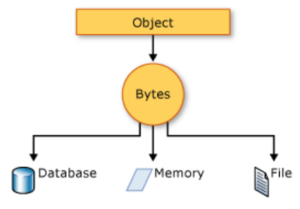Serialization
Serialization is the process of converting an object into a stream of bytes in order to persist it to memory, a database, or a file. Its main purpose is to save the state of an object in order to be able to recreate it when needed. The reverse process is called Deserialization.
How Serialization works
This illustration shows the overall process of serialization.
The object is serialized to a stream, which carries not just the data, but information about the object's type, such as its version, culture, and assembly name. From that stream, it can be stored in a database, a file, or memory.
Uses for Serialization
Serialization allows the developer to save the state of an object and recreate it as needed, providing storage of objects as well as data exchange. Through serialization, a developer can perform actions like sending the object to a remote application by means of a Web Service, passing an object from one domain to another, passing an object through a firewall as an XML string, or maintaining security or user-specific information across applications.
Making an Object Serializable
To serialize an object, you need the object to be serialized, a stream to contain the serialized object, and a Formatter. System.Runtime.Serialization contains the classes necessary for serializing and deserializing objects.
Apply the SerializableAttribute attribute to a type to indicate that instances of this type can be serialized. A SerializationException exception is thrown if you attempt to serialize but the type does not have the SerializableAttribute attribute.
If you do not want a field within your class to be serializable, apply the NonSerializedAttribute attribute. If a field of a serializable type contains a pointer, a handle, or some other data structure that is specific to a particular environment, and the field cannot be meaningfully reconstituted in a different environment, then you may want to make it nonserializable.
If a serialized class contains references to objects of other classes that are marked SerializableAttribute, those objects will also be serialized.

